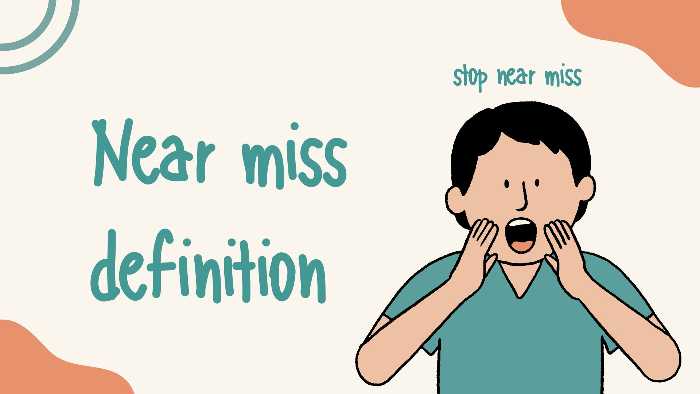Near miss definition is a toolbox topic today. You have heard me talk a lot about accidents that have occurred, but I think this is the first time that I have talked about an incident that happened without loss. I think you understand me. I mean those near-accidents, cases that make one think that he is in good luck, that he is a lucky man.
What is a near miss
Near misses means apparently no loss. They do not cause injuries. They may not yet damage equipment, but they do serve as a warning, a wake-up call, to take quick action. Otherwise, the same situation may cause a real accident next time. Less than a second or less than a fraction of an inch would have been fatal.
 |
| Near miss definition |
Suppose a motorist on his way home rushes into a boy who is running across the street after his ball. Was it good luck that he didn't run over the kid at the last second? Nope! Another driver could have hit him. He was more alert. The car can have better brakes, better lights, and better tires. However, it is not just good luck that separates a near miss from being an actual accident.
When there has been such a case, it is most likely that the next time the motorist will pass more slowly through that neighbourhood. He knows that children are playing and that they can launch themselves through the streets.
Near miss examples
Near misses here at the plant should serve as a warning as well. The condition that causes a near miss can easily cause a real accident next time when you are not alert or careless or your reflexes do not respond well.
Take spilt oil on the floor. A colleague sees it and walks around it, without stepping on it, and nothing happens. The next partner does not see spilt oil, steps on it and slips, almost falling. Another third slip, or can't keep his balance and falls, hitting badly, perhaps on his head or breaking his spine. Near miss definition
.jpg) |
| Near miss definition |
Near miss reporting and investigation
Let's remember that near misses are indisputable signs that something is wrong. For example, our stacking is poor, our housekeeping is poor, our tools are in poor condition, and our guards are not working properly. There are countless indications of inefficiency and unsafe work. Ignoring the causes of near misses is an unavoidable invitation to an actual accident.
So my friend, let's keep our eyes peeled for the little wrong things. Let's not shrug it off and do something about them: Let's correct it or report it. Let's treat near misses as if they were serious accidents. Let's not ignore the warnings. And all near misses must be investigated to uproot the causes while it's time.
I guess some of you may think: "No investigation stopped the near miss that is being investigated" And if any of you think so, you are dead wrong.
Good investigations go a long way in stopping the next accident. I have said before and I will say it again, that all near misses are caused, no near miss is accidental. If we know the causes of near misses we can do something to remove these causes and prevent another near miss.
Must educate employees on how to prevent accidents and exposures
Most near misses are caused by various reasons. We haven't learned much if we stop an investigation. For example, A man lost his balance and fell from a ladder. Nothing happened to him and also the ladder is not damaged. Apparently, no loss whether personal or property but potential to could fatal or serious injuries.
.jpg) |
| Near miss definition |
- Is the ladder defective, or if it was, why was it in use?
- Was it suddenly damaged or was it in bad shape for some time?
- Was it poorly made or just worn out from use?
- Did the worker know that the ladder was damaged and if he had reported it?
- If he didn't know it was damaged, had he been properly instructed to know the ladder's safety?
- Or was the ladder in good condition, and was it used inappropriately?
- Was it positioned at the correct angle?
- Or did the worker do something unsafe?
- Did he carry something in his hands, which had to be hoisted later?
- Did he try to go down the stairs with his face forward?
- Did he try to grab something that he dropped and lose his balance?
- Did he maintain the three-point contact?
Incident prevention
If all we know is that the man fell, then we know nothing. But if we can get to the cause (or the many causes) then we can learn something to prevent other such near misses that turn into accidents.
Everyone in the plant benefits from the investigation of near misses carried out in all areas of the company. Everyone is responsible to near miss reporting and reporting any unsafe condition or action to avoid accidents. Get rid of every dangerous condition, every bad work habit, and every defective piece of equipment before someone is injured.
Conclusion
Remember the Near miss definition very well: We do not go after anyone's head, we do not try to put anyone in evidence. We just want to stop accidents before someone gets hurt.
"NEAR MISSES" ARE WARNINGS
Related post:
prevention of accident at workplace
For more health and safety-related topics, visit: Safety Zone
Note: If you liked this toolbox and you want me to talk about another preventive toolbox topic, leave me a comment or write to munir.munir83@gmail.com
Conduct
this toolbox topic so that more people get involved in changing the culture of
prevention and together we can achieve safer, healthier and more competitive
companies.

